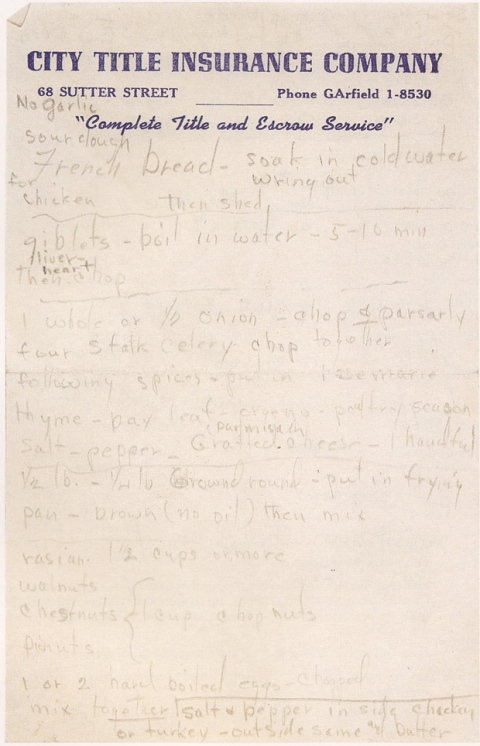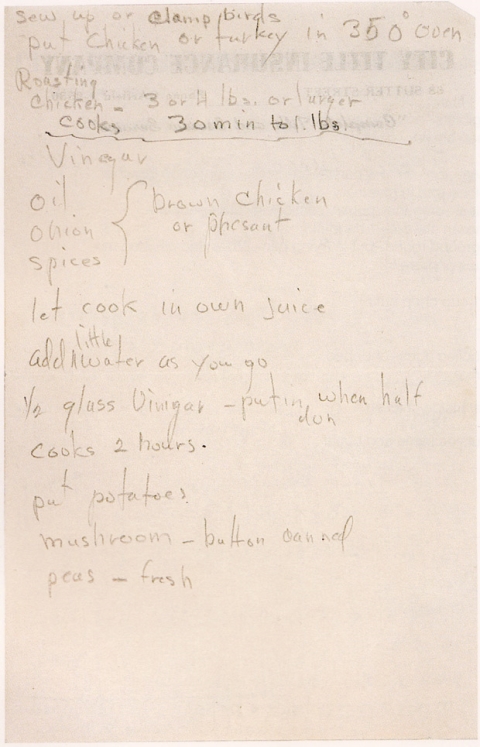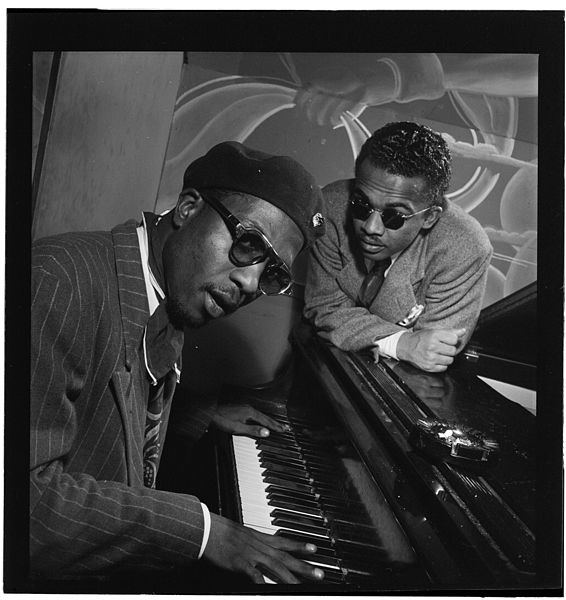
Entire industries seem to have sprung up around the mission of demonstrating that Marilyn Monroe did more in her short life than become an icon — the icon — of midcentury American starlethood. We here at Open Culture have previously featured not just her famously photographed reading of James Joyce’s Ulysses, but the contents of her personal library as well. The new book Fragments provides a great deal of rich ephemera to those scholars of Monroe’s pursuits off the screen, including, as Matt Lee and Ted Lee in the New York Times describe it, “assorted letters, poems and back-of-the-envelope scribblings that span the time from Monroe’s first marriage in 1943 to her death in 1962.” The article appears in the paper’s Dining & Wine section thanks to one Monrovian fragment of particular interest this time of year: her personal recipe for turkey and stuffing.

“Scrawled on stationery with a letterhead from a title insurance company,” write Lee and Lee, “the recipe describes in some detail how to prepare a stuffing for chicken or turkey. The formula is extensive in the number of ingredients (11, not including the 5 herbs and spices, or salt and pepper), and in their diversity (3 kinds of nuts and 3 animal proteins). It is unorthodox for an American stuffing in its use of a bread loaf soaked in water, wrung dry and shredded, and in its lack of added fat, broth, raw egg or any other binder.” You can find a transcript of the steps right below. And if you give a whirl on Thanksgiving, let us know how it turns out.
For the Stuffing
- No garlic
- Sourdough
- French bread — soak in cold water, wring out, then shred
- For chicken giblets — boil in water 5–10 mins
- Liver — heart then chop
- 1 whole or ½ onion, chop & parsley / four stalk celery, chop together following spices — put in rosemary
- Thyme, bay leaf, oregano, poultry seasoning, salt, pepper,
- Grated Parmesan cheese, 1 handful
- 1/2lb – 1/4lb ground round — put in frying pan — brown (no oil) then mix raisin 1 ½ cuops or more
- 1 cup chop nuts (walnuts, chestnuts, peanuts)
- 1 or 2 hard boiled eggs — chopped mix together
To Prep the Bird
- Salt & pepper inside chicken or turkey — outside same and butter
- Sew up clamp birds put chicken or turkey in 350 oven
- Roasting chicken — 3or 4lbs or larger
- Cooks 30 min to 1lbs
- Brown chicken or pheasant (vinegar, oil, onion, spices) — let cook in own juice
- Add little water as you go
- ½ glass vinegar — put in when half done
- Cooks 2 hours
- Put potatoes
- Mushroom — button canned
- Peas — fresh
via NYTimes, Brain Pickings and The Daily Mail
Related Content:
Marilyn Monroe Reads Joyce’s Ulysses at the Playground (1955)
Marilyn Monroe Explains Relativity to Albert Einstein (in a Nicolas Roeg Movie)
Colin Marshall hosts and produces Notebook on Cities and Culture and writes essays on cities, Asia, film, literature, and aesthetics. He’s at work on a book about Los Angeles, A Los Angeles Primer. Follow him on Twitter at @colinmarshall or on his brand new Facebook page.


